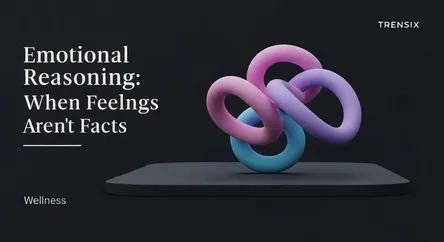Wellness
Emotional Reasoning: When Feelings Aren't Facts

Learn about emotional reasoning, a cognitive distortion where feelings are mistaken for facts, and how it can impact your mental well-being.
What is it?
Emotional reasoning is a cognitive distortion where a person concludes that their emotional reaction to a situation is evidence for the reality of that situation. In other words, it’s the tendency to believe that because you feel a certain way, it must be true, summarized by the phrase, "I feel it, therefore it is." This pattern of thinking mistakes feelings for facts and can lead to conclusions that are not supported by objective evidence. For instance, feeling anxious about a presentation is taken as proof that you will perform poorly, regardless of your preparation. This concept was first introduced by psychiatrist Aaron Beck as part of his work on cognitive distortions.
Why is it trending?
There is a growing public interest in mental health and mindfulness, leading people to identify and understand unhelpful thinking patterns. Emotional reasoning is a key concept in cognitive-behavioral therapy (CBT) and is frequently discussed in wellness circles. It's recognized as a common thinking error that can contribute to and worsen conditions like anxiety and depression. People who experience anxiety may interpret their feelings of fear as a sign of imminent danger. Similarly, someone with depression might believe their feelings of worthlessness are an accurate reflection of their character, creating a negative feedback loop.
How does it affect people?
Emotional reasoning can negatively impact decision-making, relationships, and overall mental health. It can cause individuals to avoid situations that trigger uncomfortable emotions, leading to missed opportunities for growth. For example, someone might turn down a job offer because they feel anxious about it, concluding the opportunity is wrong for them. This cognitive distortion can also strain relationships; feeling jealous may lead someone to believe their partner is unfaithful without any actual evidence. By clouding judgment, it reinforces negative self-perception and can lead to a distorted, emotionally-driven view of reality.